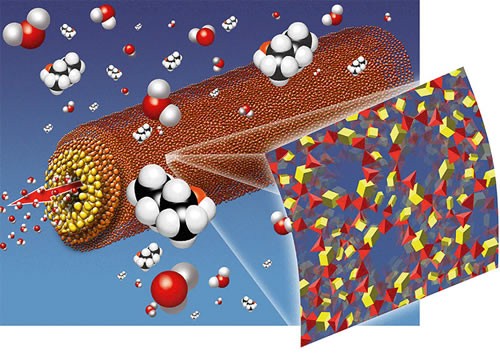In many industrial processes, a purification step is necessary. For example, in the production of bioethanol, water needs to be removed from the mixture. Distillation is often used for purification, but this is a very energy consuming process. As an alternative, membranes are applied in a purification process called pervaporation. However, high temperatures or aggressive substances damage the membranes. ECN developed the HybSi® (hybrid silica) membrane, which is much more resistant to this harsh environment, says ECN project leader Henk van Veen.
Large potential savings
ECN is involved in developing these membranes because it has the potential to reduce energy consumption in the process industry. “We are driven to help the industry save energy, which directly reduces CO2 emissions and helps to create a sustainable process,” says Van Veen. Recently, a pilot project led by Van Veen proved that in a process that uses CO2 from the steel industry, half of the energy and production costs can be saved by combining conventional separation techniques with pervaporation using a HybSi® membrane.
In the steel industry, CO2 as a by-product is captured and used for the preparation of DMC (dimethylcarbonate), which can be used as a building block for plastics. In the process, DMC must be separated from methanol. “There is a double advantage in using a HybSi® membrane for this separation,” says Van Veen. “CO2 can be re-used for the production of DMC, and because of the energy savings, a lot less CO2 is produced.”
Mature technology
Van Veen is confident that the HybSi® membrane technology has matured and is ready to play its role in a sustainable industry, as he has shown with this pilot. “ECN is still involved in further development to create a technology push. But the industry is up next, to ensure a market pull. Several parties such as Pervatech and CTI are ready to produce the membranes. It is now up to the industrial users to introduce this technology in their processes.”
